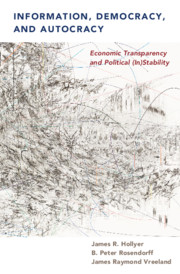Book contents
- Frontmatter
- Dedication
- Contents
- Figures
- Tables
- Acknowledgments
- 1 A New Approach to the Study of Transparency
- PART I FACETS OF TRANSPARENCY
- PART II POLITICAL (IN)STABILITY
- PART III WHY DISCLOSE
- 8 Transparency and Investment
- 9 Why Democracies Disseminate More Data than Autocracies
- 10 Why Autocrats Disclose
- CONCLUSION
- References
- Name Index
- Subject Index
10 - Why Autocrats Disclose
from PART III - WHY DISCLOSE
Published online by Cambridge University Press: 17 September 2018
- Frontmatter
- Dedication
- Contents
- Figures
- Tables
- Acknowledgments
- 1 A New Approach to the Study of Transparency
- PART I FACETS OF TRANSPARENCY
- PART II POLITICAL (IN)STABILITY
- PART III WHY DISCLOSE
- 8 Transparency and Investment
- 9 Why Democracies Disseminate More Data than Autocracies
- 10 Why Autocrats Disclose
- CONCLUSION
- References
- Name Index
- Subject Index
Summary
Opacity provides benefits for autocrats. A closed informational environment serves as ameans to obscure rent-seeking and other malfeasance, enabling autocrats to reap augmented financial rewards from their position of power. Nontransparency also hinders the coordination necessary for popular unrest and thus preserves the autocratic regime.
Yet, autocracies vary widely in the extent to which they disclose economic information to their publics. Some autocrats choose to disclose. Given the economic and political rewards of opacity, why would any autocrat choose transparency? We contend that they do so because transparency offers economic and political benefits too – even for autocrats.
As seen in the previous chapters, the dissemination of data encourages investor confidence, which boosts economic performance. If the consequences of transparency were purely economic, the trade-off would be clear – an autocrat would simply set a level of data disclosure where the marginal costs from transparency, owing to reduced opportunities for rent-seeking, match the marginal benefits, flowing from increased investment.
We have stressed throughout the book, however, that the logic of long-run political survival may weigh more heavily in the calculus of an autocrat than shorter-term material gain. To the extent that transparency causes mass-unrest, which can lead to the ouster of an autocrat, dictatorships should eschew the dissemination of economic data.
What if, however, transparency acts as a double-edged sword politically? Autocrats face many risks to their survival beyond mass unrest, and these other risks may respond quite differently to transparency. Indeed, the very prospect of the mass unrest caused by transparency may reduce the risk of other real threats to the survival of an autocrat.
Consider the interests and desires of members of a leader's inner circle: this elite may include potential rivals for the leadership. Usually loyal allies, inner-circle elites sometimes seek to overturn their leader through a coup. Recall the example of South Korea's President Park Chung Hee, who was assassinated by someone within his clique – his own intelligence chief (Adesnik and Kim 2008: 1). Rival members of the elite can successfully take advantage of such opportunities only under certain circumstances. If masses of opposition groups have coordinated, they may seize on a moment of regime disunity to strike out for regime change.
- Type
- Chapter
- Information
- Information, Democracy, and AutocracyEconomic Transparency and Political (In)Stability, pp. 269 - 314Publisher: Cambridge University PressPrint publication year: 2018



